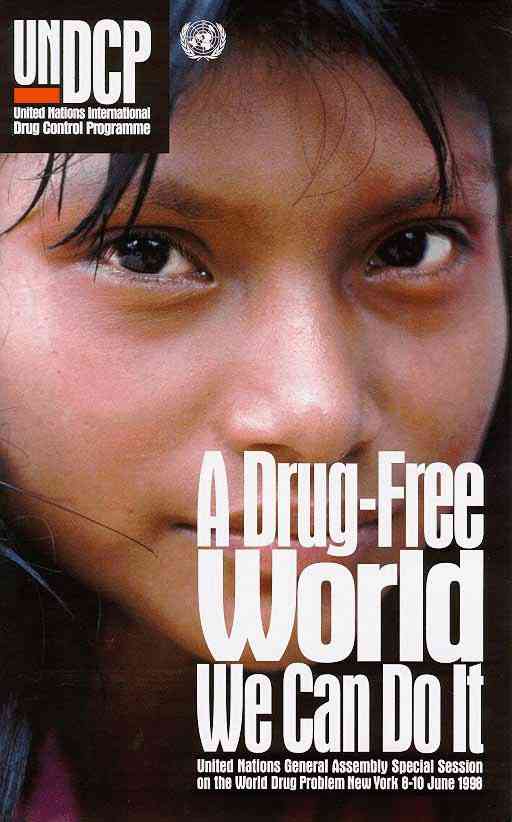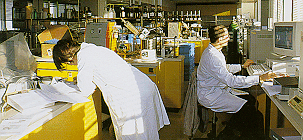

To mobilise nations worldwide to address the drug problem, the UN General Assembly will convene a three-day Special Session in June 1998. Attended by many national leaders and drug experts, the Special Session will build upon UNDCP's efforts. Nations will share their knowledge and experience, and tackle all aspects of the drug problem together.
The Special Session provides the world's Governments with a unique opportunity to develop a truly global drug control strategy.
![]() Today, the illicit drug issue affects us all; no nation is
immune from its effects. Consequently, more and more countries are looking for
solutions to their individual drug problems.
Today, the illicit drug issue affects us all; no nation is
immune from its effects. Consequently, more and more countries are looking for
solutions to their individual drug problems.
![]() The divides between East and West and North and South
that used to hinder global cooperation on many issues, including drugs, have diminished.
Countries are now working together more harmoniously than ever before.
Because the drug trade spans the globe - from Asia and Europe to Africa and the Americas -
nations realize that they need to tackle the drug problem together, as a cohesive
force. This new spirit of political cooperation provides nations worldwide with an
unprecedented opportunity to take decisive action.
The divides between East and West and North and South
that used to hinder global cooperation on many issues, including drugs, have diminished.
Countries are now working together more harmoniously than ever before.
Because the drug trade spans the globe - from Asia and Europe to Africa and the Americas -
nations realize that they need to tackle the drug problem together, as a cohesive
force. This new spirit of political cooperation provides nations worldwide with an
unprecedented opportunity to take decisive action.
Working Toward a Drug-Free World: General Assembly Special Session
As the world becomes a global village with instantaneous communication and economic interdependence, the drug issue has also taken on global dimensions. It respects no borders - if one country tightens its legislation and enforces controls, the drug industry will move to another. No country can hope to stem the drug trade on its own. The General Assembly Special Session provides an unprecedented opportunity to devise a global response to this global problem.
Today, more than 200 million people use
drugs, from glue-sniffing street children to hard-core heroin addicts. Since 1985,
opium production has tripled and cocaine production has doubled. Synthetic drugs
such as Ecstasy and Ice are the fastest growing drugs in industralised nations.


POLITICAL DECLARATION: By adopting a Political Declaration, Governments will commit themselves to concrete measures in reducing both the demand and supply of drugs, within a definite time frame. In drafting the Declaration, Governments have acknowledged that their targets will be difficult to achieve, but have resolved that "such commitments will be met by practical action and the resources needed to ensure real and measurable results".
The Special Session will focus on six main themes:
ILLICIT DRUG CROPS: As part of the balanced approach, an action plan on the elimination or significant reduction of illicit narcotic crops by the year 2008 will be considered. UNDCP's global approach for the elimination of these crops through alternative development will serve as a means to achieve these goals.
REDUCE DEMAND: The Special Session will consider adopting a Declaration on the Guiding Principles of Drug Demand Reduction - it will be the first signed international agreement to address this issue. It stresses the need to tackle the demand for drugs from all directions, from preventing first use, to giving help to occasional users, treating dependent users, offering rehabilitation and preventing the spread of HIV/AIDS. The Political Declaration also commits Governments to achieve measurable results in this area by the year 2008.
JUDICIAL COOPERATION: Strengthening and streamlining laws within and between nations is essential to halt the drug trade.
While the drug industry has become more complex and sophisticated over the last decade, so have technological innovations in the drug enforcement field. New satellite technology is now being used to survey drug cultivation, and border patrols employ state-of-the-art portable drug labs to rapidly identify drugs and catch drug smugglers at remove border crossings. On another front, agricultural economists have developed innovative alternative farming schemes, while, through trial and error, social workers have identified effective drug treatment and prevention programmes.
UNDCP spearheads international efforts to halt drug production, trafficking and consumption. It has initiated hundreds of projects across the globe, from joint-country border patrol programmes to innovative drug treatment centres and alternative crop initiatives. UNDCP has successfully reduced production and consumption in some countries, but global efforts must be enhanced to achieve similar successes around the world.
What the General Assembly Special Session will Accomplish
The General Assembly Special Session will set the agenda for drug control as we enter the 21st century. It will place the drug issue high on the agenda of Governments of the world. It will forge a global commitment from



MONEY LAUNDERING: Drug dealers generate large volumes of cash which is then laundered through the financial and banking systems. For law enforcement experts, following the money trail is often more effective than tracking the drugs. The money trail leads to the drug barons. Confiscating assets hurts the drug cartels more than confiscating drugs. At the Special Session, Governments will adopt a set of principals upon which anti-money-laundering measures will be based. As part of its technical assistance programme on money laundering, UNDCP is concluding studies on bank secrecy and off-shore centres to be completed in May 1998.
STEM ILLICIT PRODUCTION OF SYNTHETIC DRUGS: Today, the drugs of choice in many industrialised nations are synthetic, such as amphetamine (Ice), and MDMA (Ecstasy). Though a relatively new trend, synthetic drug use has surpassed that of cocaine and heroin in some industrialised countries. However, synthetic drugs can be just
CONTROL OF DRUG-PRODUCTION CHEMICALS: The manufacture of illegal drugs requires large supplies of chemicals, often called "precursors", which are difficult for traffickers to hide. While countries have agreed to monitor international shipments of certain precursors, more needs to be done. The General Assembly will adopt measures to further strengthen the control and monitoring of such chemicals.
United Nations General Assembly Special Session on the World Drug Problem
Date: 8-10 June 1998
Venue: General Assembly Hall, United Nations, New
York
Parallel Activities: Panel discussions, briefings,
mini forums, exhibitions
Further Information:
Government and Media Queries: Sandro Tucci, UNDCP
Vienna (43-1) 21345 5629
Media Accreditation: Sonia Lecca, DPI New York (1-212) 963
6934
General Queries: Contact the United Nations Information
Centre in your country or Bill Hass, DPI New York (1-212) 963 0353.
NGO Queries: Eileen McCafferty, UNDCP Vienna (43-1) 21345
5638

